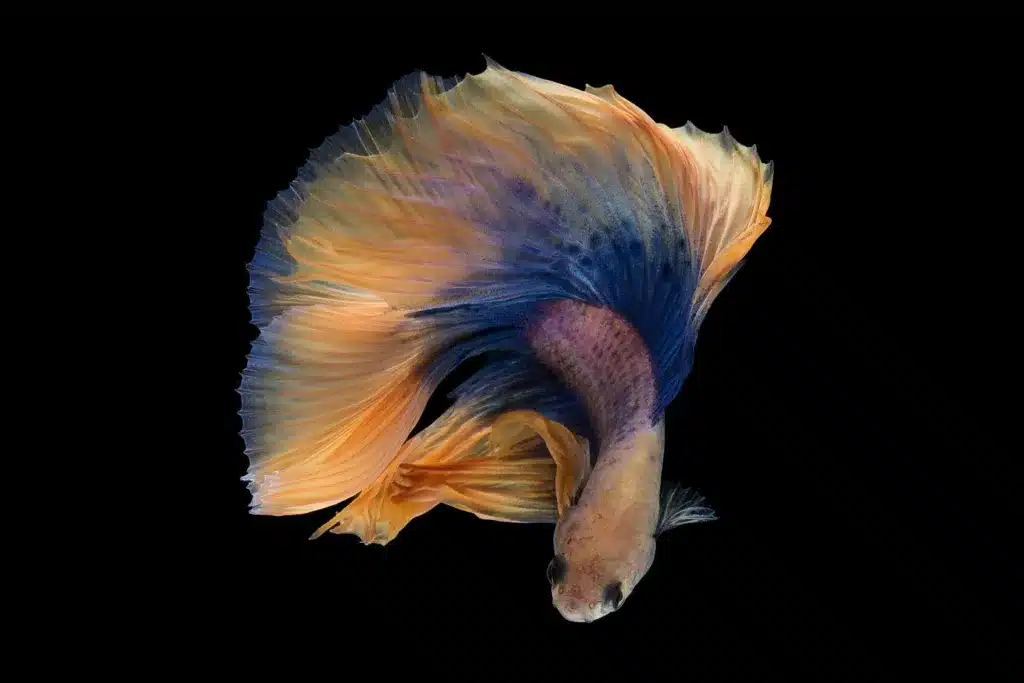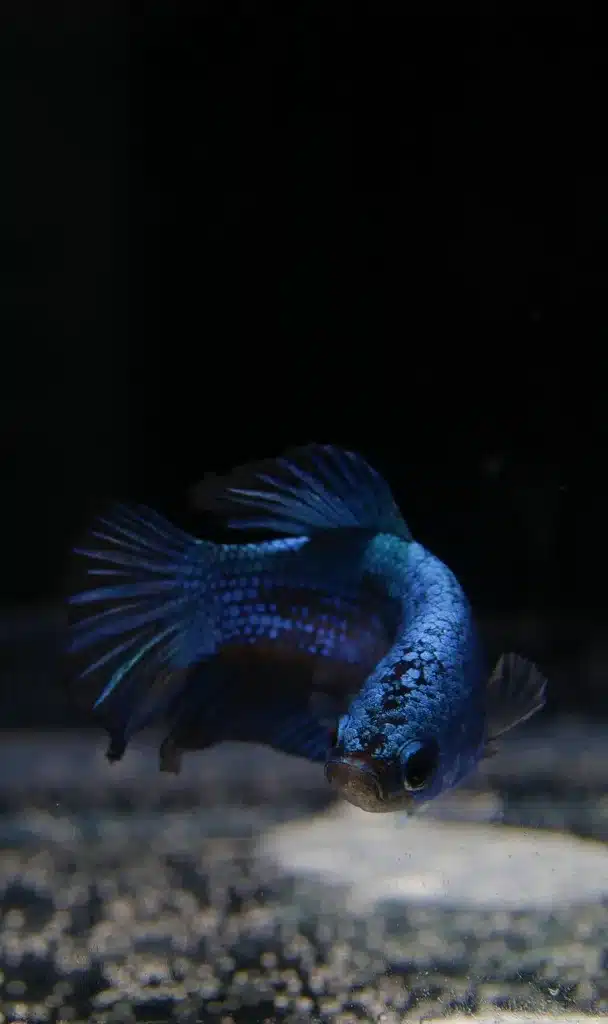Hey, fellow betta lovers! Have you ever wondered what happens if your betta fish takes a little unscheduled trip outside its tank? It’s a quirky topic, but keeping our finned pals safe and sound is essential. Today, we’re diving into the nitty-gritty of how long can betta fish go without water and what to do if they decide to explore the world beyond their watery homes. So, let’s jump right in and unravel the mystery together!
How Long Can Betta Fish Go Without Water?
When delving into how long can betta fish go without water, it’s vital to approach the topic with concern and accuracy. Given its unique biological feature, the labyrinth organ, betta fish, stands out in the aquatic world for their ability to breathe atmospheric air directly. This remarkable adaptation allows them a certain level of resilience not seen in many other fish species.
Despite this extraordinary ability, it’s crucial to underline that betta fish are predominantly aquatic creatures, and their time out of water should be minimized to prevent stress and harm. When explicitly addressing the duration betta fish can survive outside their aquatic environment, the answer is up to 2 hours. This timeframe is contingent on factors such as humidity, temperature, and the fish’s overall health and stress level during the incident.
During this critical period, a betta’s body begins to dehydrate, and its gills, designed for water, start to dry out, impairing the fish’s ability to breathe even through its labyrinth organ. Therefore, while betta fish have a slight edge over other fish that lack this air-breathing capability, any duration out of water is dangerous and can lead to significant health issues.
It is paramount for betta owners to ensure that their pets are quickly and safely returned to their aquatic habitat should they ever find themselves out of water. Additionally, taking preventative measures to avoid such situations is vital to maintaining the health and well-being of these cherished companions.

What Emergency Steps Should You Take If Your Betta Fish Jumps Out of the Tank?
Discovering your betta fish outside their tank can be a startling and worrisome experience. Despite their ability to breathe air, betta fish are aquatic creatures that require immediate attention to ensure their survival and well-being if they end up out of water. Here’s what to do if you find yourself in this emergency situation:
- Act Quickly but Calmly: Time is critical, but panicking won’t help. Quickly locate your betta fish and gently scoop them up. Using your hands is often the best method, as it allows for a soft touch. If you’re worried about harming them or their slime coat, use a wet cloth or paper to carefully lift them.
- Moisten Immediately: Betta fish can quickly become dehydrated outside of water. If possible, gently sprinkle a few drops of water over their body to prevent them from drying out too much. Avoid submerging them in water immediately to reduce the shock to their system.
- Prepare for Reintroduction: Fill a small container with water from their tank. The water should be at the same temperature as the tank to prevent thermal shock. If you have a water conditioner that removes chlorine and neutralizes heavy metals, treat the water before reintroducing your betta.
- Gentle Reintroduction: Place your betta in the prepared container. Allow them to acclimate to the water temperature and composition. After about 15 minutes, you can gently transfer them back into their main tank. This gradual process helps reduce stress and shock.
- Observe and Support: After your betta is back in their tank, watch them closely for several hours and days. Look for signs of stress or injury, such as lethargy, loss of appetite, or damaged fins. Adding a mild aquarium salt solution to their water might help them recover from any potential shock or injuries, but ensure you follow proper guidelines for dosage and duration to avoid causing harm.
- Prevent Future Incidents: Finally, take steps to prevent similar incidents. Ensure your tank has a secure lid or cover to prevent your betta from jumping out. Also, assess your tank’s environment for any stress factors that might have contributed to your betta’s leap. Improving water quality, providing adequate hiding spaces, and ensuring a peaceful tank setup can help minimize the chances of a repeat occurrence.
Handling a betta fish emergency with calmness and care can significantly affect the outcome. By following these steps, you can increase the likelihood of a full recovery for your betta fish, ensuring they continue to thrive in their aquatic home.
Why Can Betta Fish Live Longer Out of Water Compared to Other Fish?
Betta fish are unique among aquarium pets due to their ability to survive brief periods out of water, thanks to their evolutionary adaptation, the labyrinth organ. This organ allows them to breathe atmospheric air, an adaptation suited to the low-oxygen environments of their native Southeast Asia. While this trait enables betta fish to endure conditions that would be fatal to other fish, it’s crucial to remember that they are fundamentally aquatic creatures.
The labyrinth organ provides a survival advantage, allowing bettas to gulp air from the surface in oxygen-poor water. However, despite this ability, bettas thrive best in well-maintained aquatic settings. Their time out of water should be limited and accidental, as prolonged exposure to air can lead to dehydration and stress, undermining their health.
The care for betta fish should emphasize creating a stable, clean, and safe aquatic home. While their resilience is remarkable, responsible pet ownership involves preventing situations testing these survival limits. Proper tank maintenance, including securing the tank to prevent escapes, is essential for their well-being.
In conclusion, the unique biology of betta fish highlights their adaptability. It underscores the importance of understanding and catering to their needs for a healthy, vibrant life in captivity. Ensuring they remain in their aquatic environment is crucial to their longevity and happiness.

Preventive Measures to Keep Your Betta Fish Safe
Keeping your betta fish safe involves precautionary measures to prevent them from leaping out of their tank, a natural yet potentially risky behavior. A secure tank lid is essential to create a barrier while maintaining optimal water quality, and providing a stimulating environment can minimize stress, reducing the likelihood of jumping. Ensuring the tank is spacious and has a suitable water temperature is also critical in creating a comfortable habitat for your betta. Regular observation allows you to monitor their well-being and catch any signs of discomfort early.
For betta fish owners intrigued by the athletic abilities of these vibrant creatures, understanding just how high betta fish can jump is crucial for tailoring your tank setup to prevent escape attempts.
Exploring the topic “How High Can Betta Fish Jump?” unveils intriguing details about their capabilities and delivers vital tips for safeguarding the well-being of your aquatic buddy.
Conclusion
In wrapping up our discussion on the intriguing abilities and care requirements of betta fish, it’s clear that these vibrant creatures are captivating to watch and embody a remarkable blend of resilience and vulnerability. Their unique adaptation, the labyrinth organ, allows them to survive in conditions other fish cannot. Still, it’s crucial to remember that they thrive best within the safe confines of a well-maintained aquarium. Ensuring the health and happiness of betta fish requires understanding, respect for their natural behaviors, and a commitment to providing an environment that meets their specific needs.
FAQs
Q: How often should I change the water in my betta’s tank?
A: Regular water changes are vital for maintaining water quality. A general recommendation is to change 20-25% of the water once a week, but this can vary based on tank size, filtration, and the number of fish.
Q: Can betta fish live with other fish?
A: Betta fish can live with certain species, but careful consideration is needed to avoid aggression. Suitable tank mates include small, peaceful fish that do not resemble bettas or invade their territory.
Q: What do betta fish eat?
A: Betta fish are carnivorous and thrive on a protein-rich diet. High-quality betta pellets and frozen or live foods like brine shrimp and bloodworms make excellent choices.
Q: Why does my betta fish flare its gills?
A: Flaring is a natural behavior, often displayed when they feel threatened or assert dominance. It can also be a way to exercise their gill muscles. However, constant flaring could indicate stress.
Q: How can I tell if my betta fish is healthy?
A: Healthy betta fish are active, with vibrant colors and full, undamaged fins. They should have a strong appetite and show curiosity about their environment. Signs of distress or illness may include lethargy, faded colors, clamped fins, or difficulty swimming.
Understanding the unique aspects of betta fish care ensures the well-being of these beautiful creatures. It enhances the enjoyment and satisfaction of keeping them as pets. By fostering a suitable environment and paying close attention to their needs, betta fish can lead long, happy lives as cherished members of your family.
